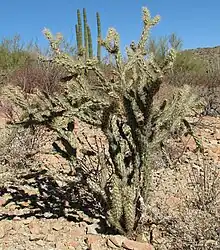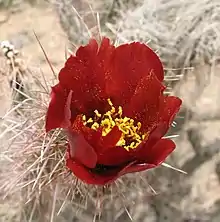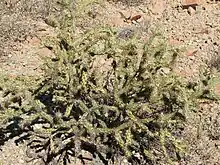Cylindropuntia acanthocarpa
Cylindropuntia acanthocarpa, commonly referred to as buckhorn cholla, is a cholla native to the Mojave, Sonoran, and Colorado Deserts of North America. Along with Cylindropuntia bigelovii (the "teddy bear" cholla), it is the most common cholla found in these deserts.
| Cylindropuntia acanthocarpa | |
|---|---|
 | |
| Scientific classification | |
| Kingdom: | Plantae |
| Clade: | Tracheophytes |
| Clade: | Angiosperms |
| Clade: | Eudicots |
| Order: | Caryophyllales |
| Family: | Cactaceae |
| Genus: | Cylindropuntia |
| Species: | C. acanthocarpa |
| Binomial name | |
| Cylindropuntia acanthocarpa | |
| Synonyms | |
|
Opuntia acanthocarpa | |
Varieties

Flower

During winter dryness.
There are a number of recognized varieties include:
- Cylindropuntia acanthocarpa var. acanthocarpa [2]
- Cylindropuntia acanthocarpa var. coloradensis — L.D. Benson; Colorado buckhorn cholla.[3]
- Cylindropuntia acanthocarpa var. ganderi — (C.B. Wolf) L.D. Benson
- Cylindropuntia acanthocarpa var. major — Engelm. & J.M. Bigelow [4]
- Cylindropuntia acanthocarpa var. ramosa — Peebles
- Cylindropuntia acanthocarpa var. thornberi — (Thornber & Bonker) L.D. Benson; Thornber's buckhorn cholla.[5]
Ethnobotany
- Early spring was called ko’oak macat (the painful moon) by the Tohono O’odham because of scarce food supplies. During this season, they turned to cacti for food and pit-roasted thousands of calcium-rich cholla flower buds.[1]
- Today's O’odham people still pit-roast or boil the cholla buds, which taste like asparagus tips.
References
- Pinkava, D.J.; Baker, M.; Puente, R. (2017) [amended version of 2013 assessment]. "Cylindropuntia acanthocarpa". IUCN Red List of Threatened Species. 2017: e.T152855A121491804. doi:10.2305/IUCN.UK.2017-3.RLTS.T152855A121491804.en. Retrieved 28 February 2023.
- USDA: Cylindropuntia acanthocarpa var. acanthocarpa
- Calflora: Cylindropuntia acanthocarpa var. coloradensis
- Calflora: Cylindropuntia acanthocarpa var. major
- USDA: Cylindropuntia acanthocarpa var. thornberi
External links
- Cylindropuntia acantocarpa photo gallery at Opuntia Web
- Calflora Database: Cylindropuntia acanthocarpa (buck horn cholla)
Wikimedia Commons has media related to Cylindropuntia acanthocarpa.
This article is issued from Wikipedia. The text is licensed under Creative Commons - Attribution - Sharealike. Additional terms may apply for the media files.
